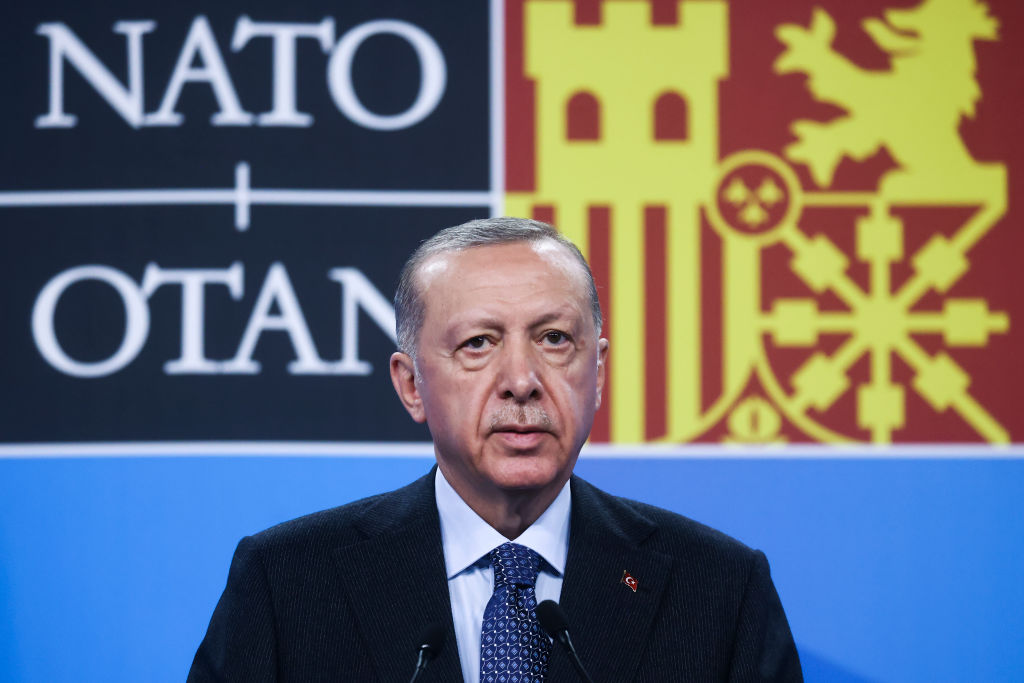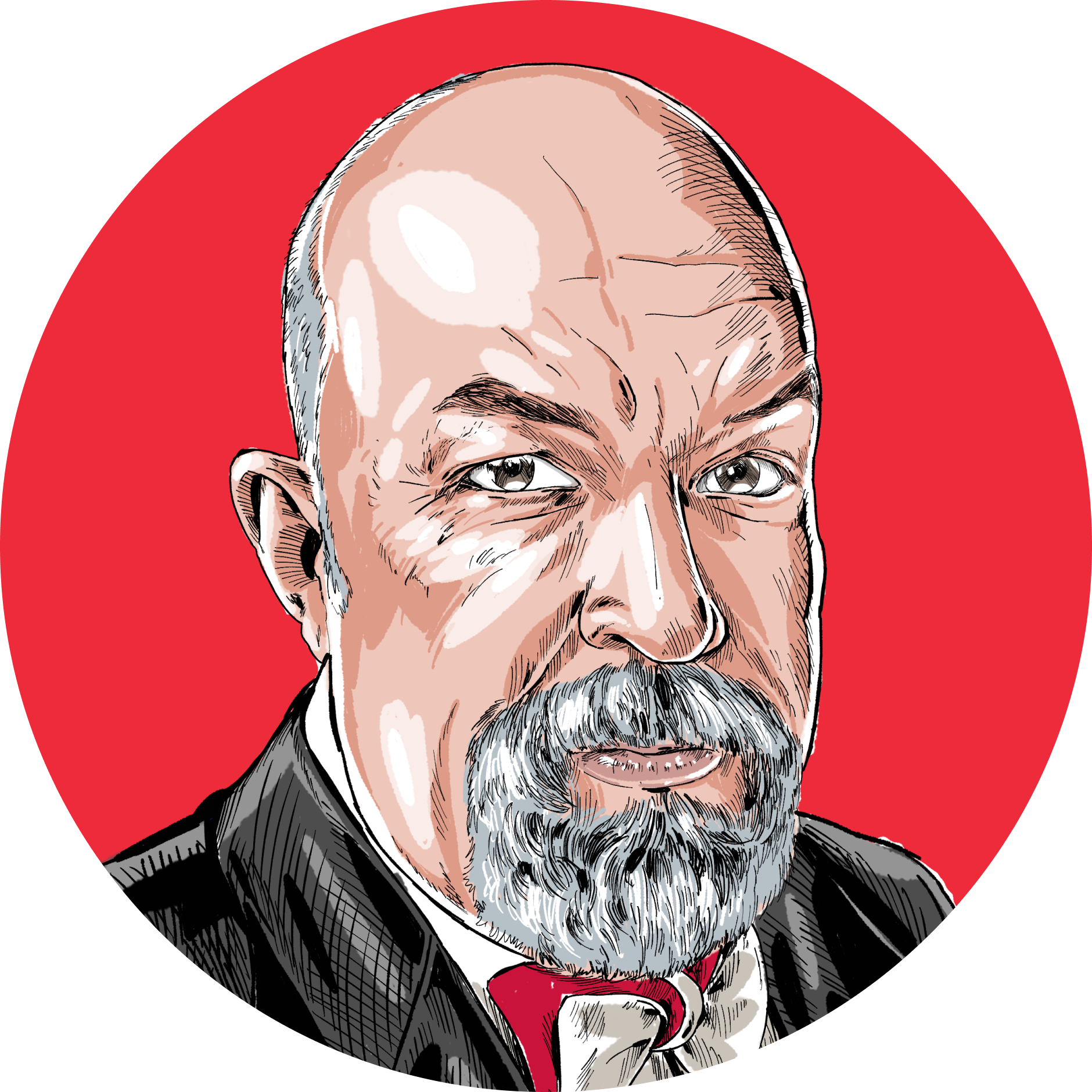Sweden and Finland want to be in NATO. NATO mostly likes this idea, but Turkey is standing in the way. Which raises the obvious question:
Why is Turkey still in NATO?
In a very diplomatic column for Bloomberg, former NATO Supreme Commander James Stavridis writes:
Sweden has a high-tech military and produces the fifth-generation Saab Gripen fighters, which I was thrilled to have in our operations over Libya. The Finns, a nation of only five million, can put hundreds of thousands of well-trained and fully equipped ground combat forces in the field in a matter of weeks. We want them on our team.
At some point soon, some NATO members are going to begin asking, “If it is a choice between Sweden/Finland and Turkey, maybe we should look at our options.” That would be a mistake. Turkey boasts the second-largest army in NATO, has important facilities including Incirlik Air Base, and hosts NATO’s overall land-warfare command in Izmir.
NATO needs Turkey to continue being an active and positive member. It also needs to add Finland and Sweden. No one wants to have to choose between them. It’s up to Erdogan to ensure that doesn’t have to happen.
This is partly sensible and risk-averse thinking, which is to be encouraged. But it also is partly wishful thinking. Reread these sentences: “At some point soon, some NATO members are going to begin asking, ‘If it is a choice between Sweden/Finland and Turkey, maybe we should look at our options.’ That would be a mistake.”
What, exactly, is the mistake? Is the mistake suggesting that “we should look at our options,” or is the mistake asking if it is a choice between Sweden/Finland and Turkey? I cannot see how either of those is a mistake. This isn’t a lark on Turkey’s part—Recep Tayyip Erdoğan has been pursuing this NATO-hamstringing policy for a good long while now, and there is no reason at this point to suppose he doesn’t mean to keep it up. It is entirely sensible to ask the question of whether Turkey is going to make this an “us or them” issue. In fact, one might reasonably make the case that, in acting as it has, Turkey already has put NATO in that position, effectively. And if Turkey is putting NATO in that position, then it cannot be a mistake to “look at our options.”
James Stavridis holds a doctorate from the Fletcher School and presumably is capable of writing just what he means. So, whence these meaningless proclamations? It is difficult to believe that he has not thought this through—he is a very intelligent and capable man. One suspects that he is having some trouble saying what he means because he does not wish to say what is plain, what everybody knows: If Turkey is going to make this a choice between the Nordic candidates and the backsliding autocracy of Recep Tayyip Erdoğan, then the right thing for NATO—and for the world—is to let Turkey be Turkey and let NATO be NATO.
One of the things NATO is, or is supposed to be, is an alliance that “promotes democratic values.” Turkey under Erdoğan can hardly be said to be a country that “promotes democratic values”—Erdoğan is, in fact, one of the world’s most important enemies of democratic values and liberal norms, in his way a more significant enemy of these than the rulers of Russia or China, from whom no one has ever expected anything else. Turkey once was a liberal-democratic success story, albeit one with some important limitations. It is today a liberal-democratic cautionary tale, the moral of which is that there are no permanent victories for liberty or democracy.
NATO has serious challenges in front of it—now, not at some distant point in a hypothetical future. The last thing it needs is to be held hostage by a regime that has a lot more in common with the one in Moscow than it does with the ones in Washington or London—or in Helsinki or Stockholm. As Stavridis writes, this is, ultimately, a choice for Erdoğan. But NATO should make it clear to Turkey exactly what the stakes here are. There is no formal mechanism for expelling a NATO member, but, as a practical matter, there are ways to show Turkey the door. It may not yet be time for last call in Brussels, but the clock is ticking.
Economics for English Majors: Marj in Charge
Whose deficits?
Of all the superstitions and legends that infest U.S. politics—that foreign aid is a big item on the federal budget, that tax cuts or infrastructure spending “pay for themselves,” that the Social Security “trust fund” is something other than a figure of speech—the most destructive may be the myth that the president, in addition to being responsible for the overall state of the economy, has some special responsibility for budget deficits. We hear about the “Reagan deficits” and the “Clinton surplus,” and we talk about how the debt grew this much under Barack Obama and that much under Donald Trump, and then will grow by x under Joe Biden.
This is, of course, pure nonsense. Presidents deliver budgets to Congress, Congress laughs at them, and then goes about exercising its own constitutional duty and power of appropriating spending and collecting taxes. It doesn’t do that in the right way—meaning “regular order”—but it does it nonetheless, through omnibus bills and continuing resolutions and whatnot. Even when presidents are members of the party that controls Congress, the actual package of taxes and spending rarely looks anything like what the president submitted to Congress, usually with great fanfare. Donald Trump’s budget, for example, called for the elimination of spending on several agencies and projects, including the Corporation for Public Broadcasting, the Appalachian Regional Commission, and the Neighborhood Investment Corporation—all of which are still truckin’ along, doing what they do.
It would be interesting, if only as an exercise, for Kevin McCarthy and the House Republicans to pretend to believe the things they say, if only for a day, and draw up a real, honest-to-goodness balanced budget. Even better, they could pretend, if only for a day, to be mentally mature, responsible, patriotic adults who can account for the fact that there is a Democratic president and a Democrat-controlled Senate, that Democrats are not going away, and that any real, meaningful, stable, long-term fiscal reform is going to have to be a genuinely bipartisan compromise with broad buy-in on both sides of the aisle.
Impossible, you say?
Consider the case of Ronald Reagan. President Reagan did not hand Congress a budget that Congress then enacted—and, unlike Trump, he never had a Republican-controlled Congress to grease the legislative skids for his agenda. Reagan had a Republican Senate at the beginning of his term and a Democratic Senate at the end, but, more important, he had a Democratic House under the speakership of Thomas P. “Tip” O’Neill, a vicious partisan and a canny politician who enjoyed the longest continuous tenure of any speaker (only Sam Rayburn and Henry Clay served more total years in their multiple terms; “Mister Sam,” as Rayburn was known, was still speaker at the time of his death.) You’ll sometimes hear the Reagan-O’Neill relationship held up as an example of how Washington used to be a less dysfunctional place than it is now, some twaddle about two Irish-American pols who could do battle all day and then have a friendly drink together. Don’t believe a word of it: They hated each other—and Reagan, a famously aloof man even among his friends, wasn’t a friendly-drink kind of guy. Jay Nordlinger has the receipts, as the kids say.
The thing is, that relationship did produce some reasonably good policy results. In spite of what you hear about “Reagan deficits,” in 1982 the deficit had been 3.9 percent of GDP, but by 1989 it was down to 2.7 percent of GDP. Federal spending was 22.5 percent of GDP in 1982 and 20.6 percent in 1989—a measly 1.9-percent reduction may not look like a lot, but it is a lot when you are talking about the GDP of the United States. Taxes as a share of GDP went down a bit during that time (from 18.6 percent in 1982 to 17.8 percent in 1989) but stayed within the usual range of the postwar era—for all the talk of Reagan’s purportedly savage tax cuts (and who writes the tax bills?) taxes as a share of GDP in 1989 were higher than they were in the Eisenhower years, famous for that 91-percent top rate.
Federal spending went up during those years, from $745.7 billion in 1982 to $1.143 trillion in 1989, but the modest reforms that were worked out during those years put the country on a better fiscal path than it had been and encouraged solid economic growth—which makes every other economic burden easier to bear.
(Figures here.)
It wasn’t economic nirvana, by any stretch, and some of those reforms happened in spite of Reagan’s best efforts—for example, Reagan agreed to a modest tax increase in exchange for future spending cuts that never came.
Which is to say: Reagan never got the budget he wanted, but he did get some good outcomes even though the House of Representatives was at the time run by a guy who would make Nancy Pelosi look like Paul Ryan. (That’s kind of a hard comparison to write, inasmuch as Trump-era Republicans despise Paul Ryan with more urgent intensity than anything they could work up for Nancy Pelosi. But you know what I mean.) And that wasn’t because Reagan had a lot of gooey good feelings about bipartisanship and compromise and such—he was a conservative and, as such, felt obliged to deal with the world as it is rather than as he wished it might be.
Republicans currently control the most important budget-control organ in Washington: the House of Representatives.
House Republicans are demanding spending cuts. Alrighty—what? “I haven’t really formulated an exact list,” said Cletus the Slack-Jawed Yokel Rep. Marjorie Taylor Greene, the manic QAnon kook from Georgia. Surprise. Somebody remind the gentlewoman from Georgia that her job is precisely this stuff—not being a Fox News panelist. The people of this republic have, for whatever reason, entrusted the national purse strings to such creatures as Kevin McCarthy and Marjorie Taylor Greene—fine, whatever, democracy can be a bitch. These people say they want spending cuts—also, fine, great, better than great: I want spending cuts, too.
What did you have in mind, Republicans?
So far, their answer is that they’ll cut spending as long as that doesn’t mean cutting spending: They say that cuts to defense spending and entitlements are off the table—i.e., the great majority of spending is off the table. Add in the politically untouchable expenditures for veterans’ benefits and the one bill that actually does have to be paid—interest on the existing debt—and you have taken enough spending off the table that you couldn’t balance the budget even if you cut everything else to $0.00.
“Put up or shut up,” they say. But I am a dreamer, and I say we can have both: Put up and shut up—stop with the ridiculous Fox News posturing and do your damned jobs.
Words About Words: Doom and Gloom
Yes, we are doomed. And that’s okay!
Doom in our time has taken on the connotation of something dreadful, final, and ruinous. Naturally, this has its roots in the tax code.
Doom comes from a very ancient set of words meaning something like “right order” or “put in its proper place.” From this, doom came to mean rules, laws, the administration of justice, that sort of thing. A law book in Old English is a domboc. To doom someone was to subject them to judgment, particularly judgment under law—the sense of judgment survives in the modern English deem. The sense of fateful finality comes from the use of the word doom in its sense of judgment in the Last Judgment of Christian belief.
And it is here that the taxman enters the story—you can have the end of the world, sure, but not until the taxman gets his cut.
When William the Conqueror came to power (Battle of Hastings, 1066 and all that) one of his first orders of business was putting together a comprehensive list of property for his tax rolls. The resulting volume (two volumes, actually) was known as the Liber de Wintonia, or “Book of Winchester,” named for the location of the royal treasury. Because the judgments in the book were deemed (deemed!) as final and unalterable as God’s pronouncements at the Last Judgment, the register was nicknamed the Domesday Book (the two volumes were the Greater Domesday and the Little Domesday) though probably not until a century or so after it was compiled. A great deal of what we know about life in England and Wales at that time is thanks to the Domesday Book—in fact, no comparably ambitious inventory was attempted again until the 19th century.
So doom, then, is associated with the two inevitabilities: death and taxes. But doom need not mean something terrible–only one’s fate. It could be a good fate–a happy doom, even though the words sound weird put together that way.
Some of the saintlier people among us will be all too happy to go to their doom, to their judgment. “Justice is what you are threatened with!” thunders Thomas Cromwell in A Man for All Seasons, to which the sainted Thomas More responds: “Then I am not threatened.” That confidence is admirable. As for me—I will be glad to have an Advocate when the time comes.
But, in any case, I am not eager to sit in judgment over anybody—I just went to some trouble to get out of jury duty. I may be in the gloom business, but I am not in the doom business.
In other language bidness, a reader writes:
The following sentence appeared in a Boston Globe article this morning. From the context, it’s clear that the writer meant to praise New England Patriot QB Brian Hoyer by pointing out that “his leadership as a veteran voice can’t be understated,” which, of course, means precisely the opposite of what was intended. You see this mistake made all the time. Is there a name for it? Why is this so hard to get right?
I don’t know if there is a name for this trouble—I’m going to call it the “Kantian backflip,” the conflation of ought with can. “Ought implies can,” the proverb goes, meaning that to say somebody ought to do something implies that they can do that thing, the converse being that it is meaningless to insist that somebody should do something that he cannot do.
What the Boston Globe writer meant to say was that Hoyer’s leadership ought not be understated, not that it cannot be understated. Meaning that it is significant and considerable to such an extent that we might hyperbolically claim that it is impossible to overstate how important it is—i.e., no description of its importance, no matter how grandiose or superlative, would amount to an overstatement of the facts.
When I taught writing, one of the things I always told my students was—obvious as it sounds—to read the words they have written, as they are written, literally. This will save a great deal of trouble: For example, you will not write “I could care less” when you mean “I could not care less” if you will take the time to read the words and think about what they actually mean. Students would sometimes ask me about writing style, and some would insist, in their delusion, that they had one. My advice to them was (and is) that they should learn to write sentences in which the words they write, in the order they are written, mean exactly what they wish to say.
An additional thought: “Can’t be overstated” and “shouldn’t be understated” are kind of dumb constructions, certainly hackneyed. In most cases, there will be a better way to say what is intended, in part because “can’t be overstated” is rarely true. One might write, “Hayek’s contributions to the social sciences were enormously consequential,” but it would, in fact, be overstatement to write, “Hayek was obviously and unquestionably the most important thinker of the 20th century.” Top 10, I’d say, but there were some heavy hitters in those years! Einstein, Feynman, Planck, Wittgenstein, Heidegger, Eliot, Coase, Buchanan.
And Furthermore …
I’m a “more is more” guy, but I would not have guessed that the market would support two Pamela Anderson memoirs.
Elsewhere
There are many things to which one may become addicted, and pills aren’t the worst of them. But all addictions involve degradation. Whatever it is you tell yourself you won’t do to get political power—even the pettiest and most transitory kind—you’re pretty much making a list of everything you will do. That bizarre clatter you hear is Republicans learning to walk in heels.
“Purge artists,” is how I describe the ancient Roman Senate and its penchant for trying its own members on corruption charges. More on The Dispatch Podcast, with Jonah Goldberg, Declan Garvey, and yr. obt. svt., etc. etc.
You can buy my most recent book, Big White Ghetto, here.
You can buy my other books here.
You can see my New York Post columns here.
In Closing
History is very short, if you look at it the right way. Today on the liturgical calendar there are observances for several martyrs, including Saint Martina, the daughter of a Roman consul, martyred in A.D. 228, and Blessed Zygmunt Pisarski, who lived long enough to be photographed—he was one of the many Christian victims of the Nazis. Father Zygmunt was the priest of a Polish parish that had been persecuted by communists before the war, and, when the Germans arrived, the Gestapo wanted to know who these communists were. Father Zygmunt, knowing that the communists would be murdered if he named them, refused to tell the Germans what they wanted to know, and so they shot him—he died to save the lives of those who hated and reviled him, who would have done to him what the Gestapo did and worse had they been given half a chance. Who could be expected—who could expect himself—to do such a thing? I always cringe a little bit when people talk about what a “comforting” faith Christianity is.









Please note that we at The Dispatch hold ourselves, our work, and our commenters to a higher standard than other places on the internet. We welcome comments that foster genuine debate or discussion—including comments critical of us or our work—but responses that include ad hominem attacks on fellow Dispatch members or are intended to stoke fear and anger may be moderated.
You are currently using a limited time guest pass and do not have access to commenting. Consider subscribing to join the conversation.
With your membership, you only have the ability to comment on The Morning Dispatch articles. Consider upgrading to join the conversation everywhere.